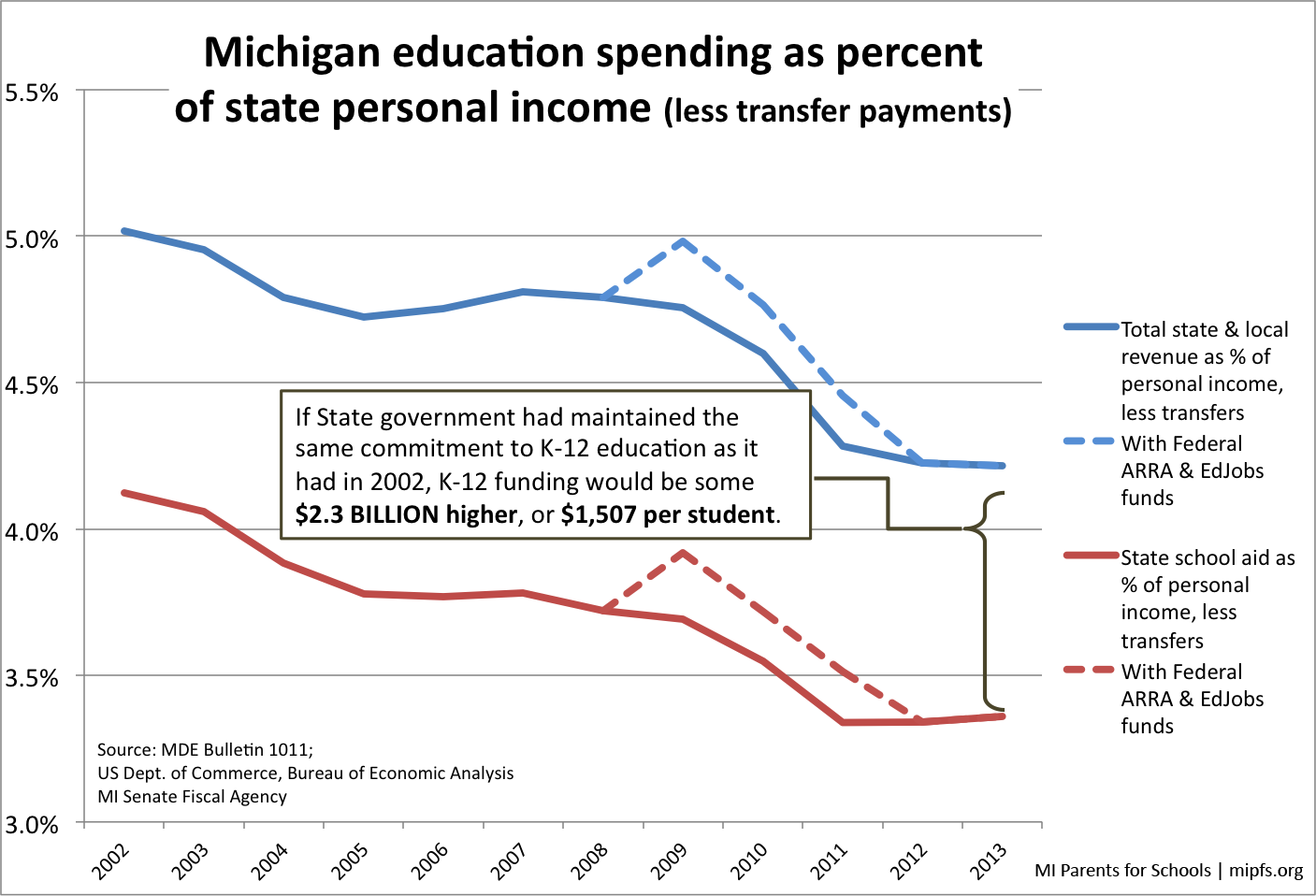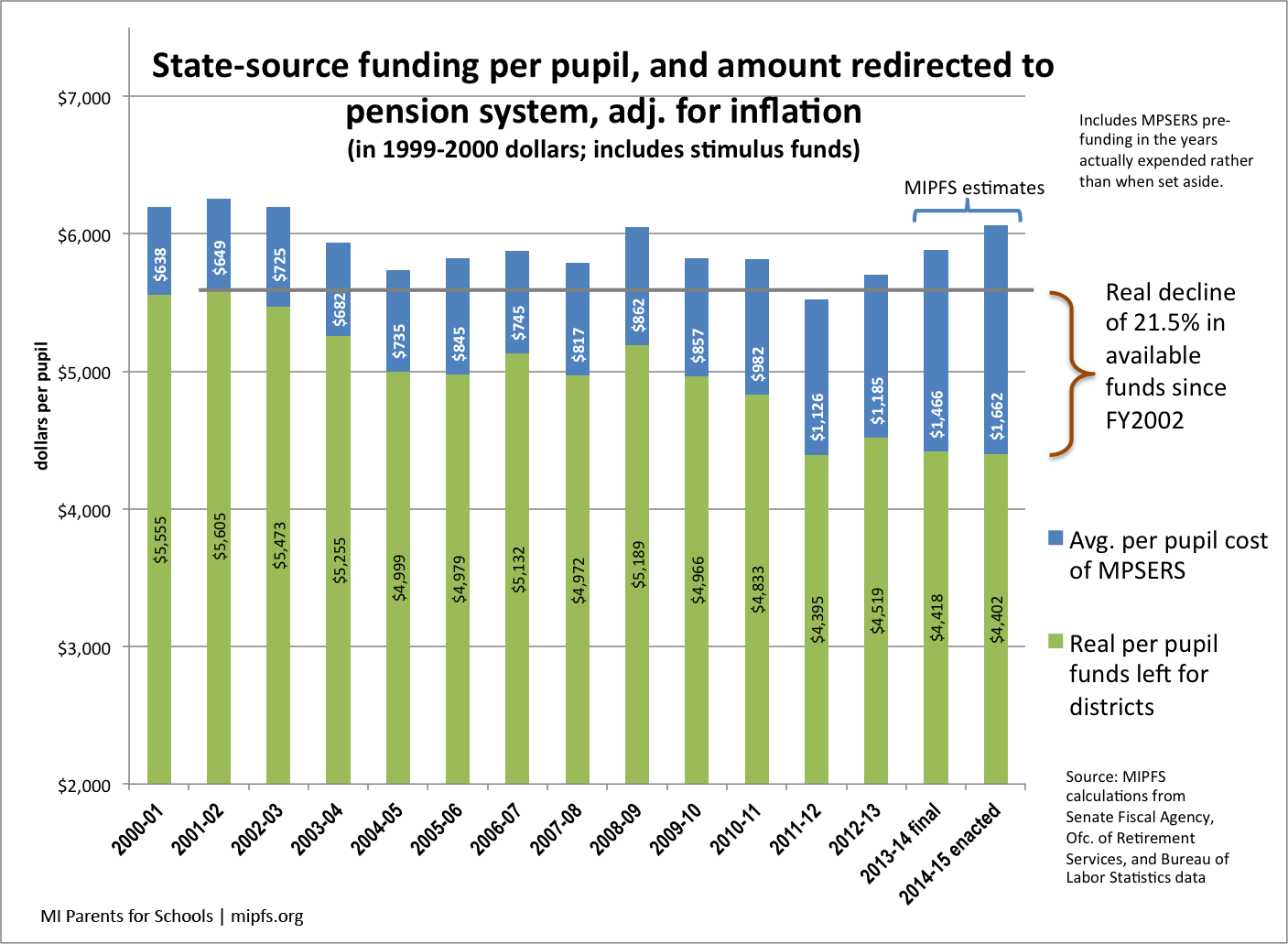Our story, Part II: Michigan's new "DEW" line
| Attachment | Size |
|---|---|
| 0 bytes | |
| 0 bytes |
Rather than early warning of a nuclear strike, a package of bills now before the Michigan Senate aim to give early warning of a school district in financial distress - a "deficit early warning" system, if you will. But if our lawmakers truly want an early warning, they should simply ask the parents, teachers and staff of our schools what they have been forced to do by Michigan's persistent failure to invest in public education.
These bills escalate the penalties for districts in financial difficulty - and layer on reporting requirements that seem primarily aimed at placing blame on the locals - while completely failing to acknowledge that districts might be in distress because of the actions of the Legislature. The bill package continues the neat shift of blame: the Legislature and Governor make the decisions about school funding, but the responsibility for cutting programs and opportunities available to our children is left for local school boards to shoulder.
At base, there are two competing stories about what is happening to our schools, and one of them is driving these bills forward.
The Fiction - Bill supporters clearly believe in the story that local public schools are simply another example of wasteful government bureaucracy. That story makes our public schools sound as if they were created to be a jobs program for unionized teachers. Incompetent or politicized school board members and self-interested administrators spent money irresponsibly and then have refused to face the financial consequences.
The Reality - The true story, in the vast majority of districts, runs more like this: all school districts, especially smaller ones, have worked hard to keep their budgets balanced and maintain a quality education. But state funding that has not kept up with needs, along with enrollment losses (as people left the state, and to charters), have forced districts to cut their budgets year after year. Those cuts have meant the end of arts, career and technical, language and other programs not required under state law. School libraries are only open sporadically (if at all), and school nurses cover many buildings. Most notably, class sizes have continued to increase year after year.
Because of the way our schools are funded, every child that leaves costs the district more money than it saves from having one less student. So budget cuts cause families to look elsewhere, which drives more budget cuts, which scares off more families, and so on. We call it the "death spiral," and many districts are caught in that bind today. Most others are barely keeping their heads above water.
 Instead of helping those districts, the "deficit early warning" bills would punish them for financial troubles caused largely by the state and then justify having the Treasury Dept. take them over to slash spending and speed up their demise.
Instead of helping those districts, the "deficit early warning" bills would punish them for financial troubles caused largely by the state and then justify having the Treasury Dept. take them over to slash spending and speed up their demise.
Q: How does this make any sense for our children?
A: It doesn't.
Q: So what are we going do do about that?
A: Speak out, and make our lawmakers take responsibility for the vise they have put our local school districts in.
Reprinted below is the letter MIPFS sent to members of the Senate Appropriations Committee when they held the one public hearing on the bill package. Copies of a printed version of our letter, as well as our Legislative Brief on the bill package, are available for download at the end of the article.
Dear Chairman Kahn and members of the Appropriations Committee,
I write to you today on behalf of parents across the state of Michigan to express our concern about the school district deficit "early warning" bills now before your committee (SB 951, 952, 953, 954, and 957). While the bills are very complex, as is the subject matter they cover, our general concerns can be stated rather simply.
Our objections to the bills stem from the fact that they seek to address the symptoms, rather than the root causes, of school districts' financial distress. Moreover, they reinforce the notion that financial distress can only be the result of poor governance or management by local district officials. The punitive sanctions in the bills, and the narrow provision of technical assistance to help districts cut their budgets sufficiently, underline this view of the problem.
This "convenient" fiction continues to place full responsibility for choosing cuts to our children's schools with local school boards and administrators. It also allows our state government to avoid any responsibility for the policy choices which have directly led to a record number of districts facing deficits and the huge number which might be identified as being in financial distress under these bills.
 What these bills will not change is the fact that our state has committed a smaller and smaller share of our economy to K-12 public education over the last decade or more (please see chart A, at right). In good times and bad, the share of our state's economic resources used for elementary and secondary education has declined.
What these bills will not change is the fact that our state has committed a smaller and smaller share of our economy to K-12 public education over the last decade or more (please see chart A, at right). In good times and bad, the share of our state's economic resources used for elementary and secondary education has declined.
Nor will these bills change the fact that the dollars per pupil available for schools to spend on operations, after mandatory contributions to the state school employee pension system are subtracted, continues to decline in real terms (please see chart B, at left).
 Finally, these bills do not address the fact that enrollment losses drive disproportionate budget cuts, since the savings from having one less student is much smaller than the lost revenue. These budget cuts then spur more families to flee the district, spurring more
Finally, these bills do not address the fact that enrollment losses drive disproportionate budget cuts, since the savings from having one less student is much smaller than the lost revenue. These budget cuts then spur more families to flee the district, spurring more
budget cuts. We have already seen many districts caught in this "death spiral," and more will fall into it if our school funding policies do not change soon.
We sincerely hope that the Committee will reconsider these bills and instead investigate policy choices that would ensure all districts have the resources they need to provide a quality education to our children today, and in the future. (In this connection, you may find our recommendations submitted to the State Board of Education helpful; they are available here: http://mipfs.org/node/220.)
Respectfully,
Steven J. Norton
Executive Director, MI Parents for Schools
- Log in to post comments
